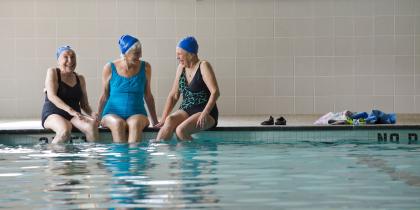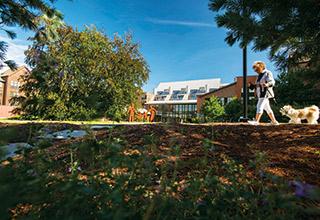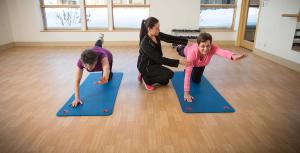Dive Into Better Health: Why Older Adults Should Consider Swimming
Read about the benefits of this healthy hobby and swimming safety considerations to keep in mind.

It’s summertime! For water lovers, warm weather presents the perfect opportunity to take a dip in the pool or go to the beach with family and friends. Thanks to the unique benefits of being in the water, swimming can also be an excellent option for older adults to incorporate into their regular exercise routine.
How swimming can improve your health
Let’s explore how swimming can improve your physical and emotional well-being:
Physical benefits of water workouts
Swimming is a fun way to train your whole body. From the muscles in your upper body to your core and lower extremities, swimming works it all!
Swimming is a form of cardio exercise that gets your heart pumping and breathing rate up. Regular cardio workouts can help your cardiorespiratory system — your heart, lungs, and blood vessels — stay healthy and strong.
Swimming is great for your muscles, too. You’re improving your muscular strength by fighting against the water resistance of the pool or body of water you’re swimming in. Your core muscles are also working to keep you steady in the water.
If you have a chronic health condition, swimming can reduce some barriers that might stop you from participating in other forms of exercise. One study on aquatic exercise in older adults explains that pain from conditions like arthritis, a fear of falling, and functional limitations can make some land-based exercise a little challenging and that aquatic exercise can offer a good alternative.
If you can’t participate in weight-bearing exercises, the fact that you float when you swim may help. Remember to get clearance from your doctor before starting any exercise program, even if it isn’t weight-bearing.
Other research has also demonstrated the benefits of swimming. One study found that aquatic exercise can have clinically relevant benefits in people with knee and hip osteoarthritis for pain, disability, and quality of life. Being buoyant in the water makes it easier to move your joints through their full range of motion, which can improve your mobility and flexibility.
Emotional benefits of water workouts
Swimming isn’t only good for your body physically — it’s also good for your mind! If you decide to participate in group swimming lessons or water aerobics classes, it can promote opportunities for socialization and foster a sense of community with other class members. That can help a lot if you’ve been feeling lonely, which many older adults experience. In fact, the University of Michigan’s National Poll on Healthy Aging found that over one in three older adults reported feeling isolated in the past year.
Like other forms of exercise, swimming releases endorphins, the feel-good hormones that help relieve stress and improve your mood. Aquatic exercise has even shown promise as a conservative treatment for managing mental health conditions like depression.
If you want to get moving and reap these benefits but swimming doesn’t feel right, don’t give up! Another form of gentle exercise, such as walking or tai chi, may be precisely what you’re looking for.
Swimming safety considerations
Before you get started, here are some safety tips to keep in mind when it comes to swimming:
- Stay well hydrated. Even in the pool, you’re still getting a workout. If you’re exercising outdoors, the heat of the sun could cause you to become dehydrated quicker.
- Remember sun safety when swimming outdoors. You may feel cool and refreshed in the water, but you can still burn. The Skin Cancer Foundation recommends using a water-resistant, broad-spectrum sunscreen with an SPF of 30 or above during extended outdoor activity and reapplying it after swimming.
- If you’re swimming in the ocean or a lake, watch out for hazards such as poor weather conditions, changing tides, drop-offs that affect water depth, and boaters.
- Get out of the water immediately if you’re outdoors and there’s a thunderstorm in the area.
- Never swim alone. Even strong swimmers can have accidents. If you are alone, ask a lifeguard to keep an eye on you if there’s one available.
- Know where the stairs and ladder are to help you get in and out of the pool.
- Be cautious of wet spots on the ground.
- Wear sandals or water shoes to help reduce your risk of slipping and falling.
What is my most important tip when it comes to starting swimming? Have fun, and stay safe!
The importance of water temperature
Pool temperature should be a top consideration to keep your swimming environment safe. If you’re swimming in a public pool, the temperature should be posted for you to see. On average, I’ve seen that public pools often keep their temperature at 77 to 82 degrees Fahrenheit.
The National Center for Cold Water Safety explains that anything below 77 degrees Fahrenheit can start to impact your ability to breathe, so pay attention to your body and how you feel. Feeling cold, numb, or shivering are all signs that you may be too cold. A few risk factors for hypothermia include age, chronic illnesses that affect blood flow, and certain prescription medications. That’s another important reason for checking with your doctor before swimming.
If you have your own pool, you may want to experiment with the temperature a little to find what’s most comfortable for you. The American Red Cross states that a comfortable water temperature for a swim class is between 83 - 86 degrees, so you may find that you prefer it a bit warmer.
Find an accessible pool near you
If you have a disability, limited mobility, or are unsteady on your feet, a pool lift can help make swimming a more accessible experience. Every Department of Conservation & Recreation swimming pool in Massachusetts has an outdoor chair lift to help you access the water. Many pools also have ramps into the water or zero-depth entry. You can find a list of accessible pools and spray decks in Massachusetts state parks here.
Soak up a life of wellness at Hebrew SeniorLife
If you’re a swimmer, you’re in luck at Hebrew SeniorLife. Our spacious indoor pools at Orchard Cove in Canton, MA, and NewBridge on the Charles in Dedham, MA, have pool lifts to make swimming accessible to our residents. You can enjoy the tranquility of our pools on your own or meet new friends in group water aerobics classes — it’s up to you.
Are you interested in learning more about senior living? Connect with us online today.
Blog Topics
Learn More
Luxurious, Intergenerational Living
At NewBridge on the Charles in Dedham, MA, you'll find modern senior living on a 162-acre intergenerational campus. We offer a complete continuum of care to support your best life, as you define it.

A Community for Residents, By Residents
Orchard Cove, in Canton, MA, offers living options that span the full continuum of care, including independent living. The community is bustling with activities, from life-long learning to entertainment.




